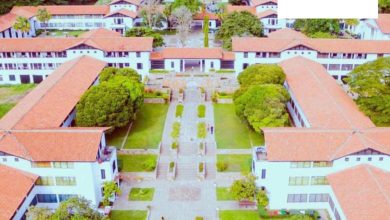University of Ghana – UG Course Outlines
-

UG Admission and Accommodation (Residential ) Fees for 2023/2024 Academic Year
UG Admission and Accommodation (Residential ) Fees for 2023/2024 Academic Year Arrangements for Students’ Accommodation for 2023/2024 Academic Year COLLEGE…
Read More » -

sts student Portal login 2024
sts student Portal login Interested in studying at UG Apply, Register, Change personal information, get academic and other information, and…
Read More » -

University of Ghana Undergraduate, Postgraduate, Distance admission Open | FEES
Undergraduates How to Apply UG Admissions and Buy Voucher 2023/2024 Check All Courses and their Detailed outlines 2023/2024 UG Admission…
Read More » -

How To Apply (Post-First Degree Programme) University of Ghana 2024
How To Apply (Post-First Degree Programme) Ghanaian Applicants University of Ghana online application E-VOUCHERS can be obtained by Ghanaian applicants…
Read More » -

How to Apply University of Ghana Postgraduate Admission 2024
How To Apply – Postgraduate Programmes GHANAIAN APPLICANTS University of Ghana application e-voucher can be obtained by Ghanaian applicants for…
Read More » -

Graduate Admissions 2023/2024 Academic Year Open | University of Ghana FEES | Apply
Graduate Admissions 2023/2024 Academic Year Open | University of Ghana FEES | Apply Graduate Admissions 2023/2024 Academic Year It is…
Read More » -

University of Ghana tuition fees for international students
As you plan to study at the University of Ghana, these fees are to keep you informed to make a…
Read More » -

University of Ghana Sandwich Programmes / Tuition Fees for Ghanaians and International Students
This information is for our audience seeking admission, it is to help you prepare and to have an idea of…
Read More » -

Compare Fees; University of Ghana (UG) Postgraduate Programmes / Fees
We’ve realized Students stay away from certain courses because they seem not to know the details, seekersnewsgh has dedicated this…
Read More » -

Courses Under M.A/M.PHIL RELIGIONS University of Ghana 2024
We’ve realized Students stay away from certain courses because they seem not to know the details, seekersnewsgh has dedicated this…
Read More » -

2024 Courses under BSC IN RADIOGARPHY DIAGNOSTIC AND THERAPY RADIOGRAPHY University of Ghana -Legon
We’ve realized Students stay away from certain courses because they seem not to know the details, seekersnewsgh has dedicated this…
Read More » -

Courses Under M.A./M.PHIL ENGLISH University of Ghana 2024
We’ve realized Students stay away from certain courses because they seem not to know the details, seekersnewsgh has dedicated this…
Read More » -

2024 Courses Under MEDICINE AND THERAPEUTICS University of Ghana
We’ve realized Students stay away from certain courses because they seem not to know the details, seekersnewsgh has dedicated this…
Read More » -

All You need to Know; Courses Under PHARMACY University of Ghana 2024
We’ve realized Students stay away from certain courses because they seem not to know the details, seekersnewsgh has dedicated this…
Read More »




